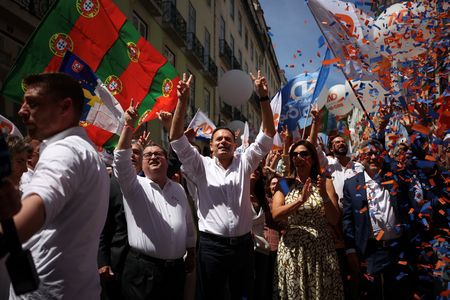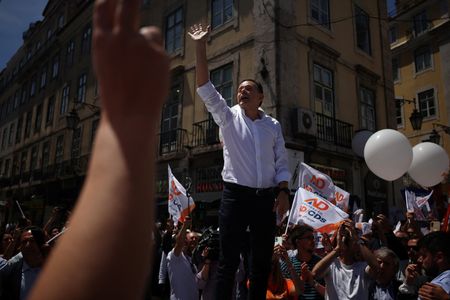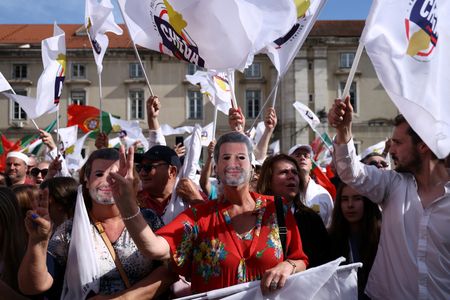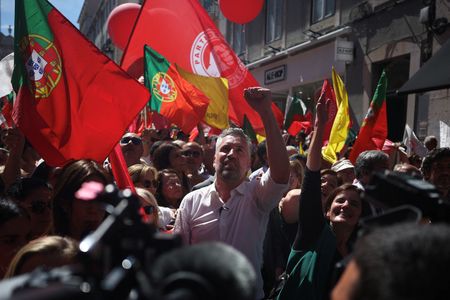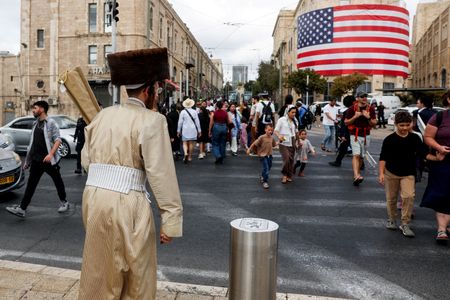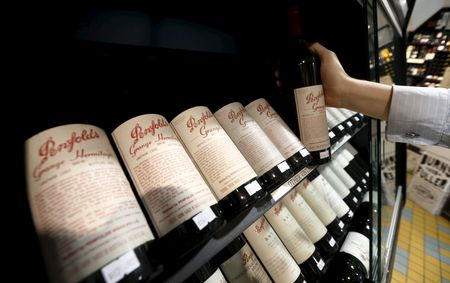By Catarina Demony and Miguel Pereira
LISBON (Reuters) – Portuguese political parties were wrapping up their campaigns on Lisbon’s streets on Friday ahead of a general election on Sunday – the country’s third early vote in as many years – that polls indicate is unlikely to yield a stable government.
Supporters of the three main parties converged on Baixa Chiado – among the capital’s most iconic neighbourhoods – for separate rallies.
The leader of far-right, anti-immigration party Chega, Andre Ventura, made a surprise appearance at his party’s final event having previously said he would miss it.
The 42-year-old was rushed to hospital on Thursday – the second such incident this week – but has since been discharged. The party said he had suffered an esophageal spasm.
Struggling at times to address the rally, Ventura thanked healthcare professionals and said his own health did not compare to the issues the country faces. Some supporters shouted for the far-right leader to “go home and rest” .
“It would have been better for him to stay at home because he was very down but we were naturally happy (with the surprise),” said 58-year-old Miguel Faustino, a Chega supporter who attended the rally.
Sunday’s race – three years ahead of schedule – was called after Prime Minister Luis Montenegro failed to win parliament’s confidence in March in a vote he himself proposed after the opposition questioned his integrity over the dealings of his family’s data protection consultancy.
Montenegro has denied any wrongdoing.
The final pre-election opinion survey carried out by Lisbon’s Catholic University, released by broadcaster RTP late on Thursday, showed little change from earlier polls.
It forecast the ruling centre-right Democratic Alliance (AD) garnering the most votes but no parliamentary majority. That would be a similar outcome to the previous ballot in March 2024 though with a slight boost for AD.
‘NOTHING GUARANTEED’
“I have a big fear that things won’t be approved in parliament (if AD does not get a majority),” said 75-year-old Maria Alice Nazareth, a long-time supporter of PSD, the main party of the AD coalition.
The Catholic University poll put AD at 34%, up from 32% in the same poll a week ago and above nearly 29% garnered in last year’s election which led to an AD-led minority government.
“All indicators point to us being on the right track, but nothing is guaranteed,” Montenegro said surrounded by upbeat supporters waving flags and shouting political slogans at AD’s rally on Friday.
Support for its rival, the centre-left Socialist Party (PS), dropped to 26% from 28%.
At PS’ rally, where some supporters carried large balloons in red – the party’s colour – leader Pedro Nuno Santos urged people to vote on Sunday, saying his party would bring stability to the country.
Young PS supporter Mariana Felix, 20, said she was frustrated about having to go to the polls so frequently.
“I hope next year I won’t have to vote again, and I hope we have a firm government, which I think is what Portugal needs at the moment,” she said.
According to Thursday’s poll, Chega, with whom Montenegro refuses to make a deal, is polling steadily in third place at 19%, little changed from its result last year.
At Chega’s rally, a protester was attacked by some of the party’s supporters, including by one who put a flag pole against his neck. The protester was then escorted out by the police.
Liberal Initiative, with which AD shares similar views on some economic issues, was polling at 7%, slightly better than a year ago, but not high enough for a potential alliance between the two to achieve a full majority.
(Reporting by Sergio Goncalves, Catarina Demony, Miguel Pereira, Elena Rodriguez and Leonardo Benassatto; Editing by Charlie Devereux, Andrei Khalip, Joe Bavier, David Latona and Toby Chopra)

